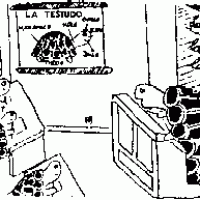Mesaĝoj: 28
Lingvo: English
Zumanto (Montri la profilon) 2009-januaro-20 04:17:41
The difficulty of an auxiliary language should be judged in and of itself, without expecting learners to have previously studied certain languages. If the easiness of Esperanto is predicated on Asians having already studied, for example, English, then that's not a great endorsement I think.
However, the thing that I personally thinks makes Esperanto so easy and flexible, is that you can speak it in the manner of your own language. You don't have to completely change your way of constructing sentences in order to speak it. I don't believe that Esperanto is the best possible auxiliary language, but it's a functional auxiliary language which is reasonably easy to learn and reasonably widely spoken (compared to other such languages). The vocab is unfair to Asians, yes, but it's not the end of the world. Still though, I really agree with Claude Piron that people should not introduce unnecessary roots into the language.
FreeXenon (Montri la profilon) 2009-januaro-20 16:40:56
If the language has similarities to European languages then non-Europeans will have problems learning it. If the language is similar to Asian languages then non-Asians will have a problem learning it.
There is really nothing that can be done about this, and this will always be an issue. As RiotNrrd Esperanto's roots appear European and its grammar has similarities to Asian Languages so we have a little bit of both worlds.
jmnsho
=)
melanija (Montri la profilon) 2009-januaro-20 19:07:14
For example, the root for eat, 'manĝ-' sounds to me like it could be a cognate for the English word 'mange', which is a skin disease. It doesn't sound like any of the other words I know for eating in other languages: 'essen', 'comer' or 'taberu'. So not only can it be mistaken for a false cognate, but knowing the word in 3 European and one Asian languages doesn't help me at all.
Another example is the word 'grava', which means 'important'. Here I can compare it to my native English with the word 'grave' as in something of 'grave importance'. This does help me remember the meaning, but at the same time I have to remember that it is not a direct translation and the words, while related, have very different meanings. Similarly with 'demando', I have to remember not to get insulted by someone demanding me when they really just have a question!

I also occasionally forget which Esperanto words are similar to words I know in English. I often find myself wanting to convert words into Esperanto like 'importanta' instead of 'grava' since many words are so similar in that way, which doesn't really help me learn the correct word.
So, knowing European languages does give me some tools to compare words and give me hints that help me learn the Esperanto words (in some cases), but I still have to learn a new vocabulary, even if it is slightly easier. I've also used these techniques for learning non-European vocabulary, however. For example, I remember the Japanese word 'eat', 'taberu', because it is similar to the English word 'table', which is where you eat. In this case, though, it's merely coincidence.
And still, the use of affixes to create new words makes it so that no matter what language background you have, there are so many fewer meanings to memorize than in other languages. Diversifying the vocabulary might have made the language seem more equal, but I really don't think it would make it much easier.
mnlg (Montri la profilon) 2009-januaro-21 08:34:42
melanija:For example, the root for eat, 'manĝ-' sounds to me like it could be a cognate for the English word 'mange', which is a skin disease. It doesn't sound like any of the other words I know for eating in other languages: 'essen', 'comer' or 'taberu'. So not only can it be mistaken for a false cognate, but knowing the word in 3 European and one Asian languages doesn't help me at all.I know it is beside your point, however the etymology is from Latin 'manducare' (to stuff one's mouth, to feast), through Italian "mangiare", and French "manger".
"essen" and "eat" quite probably come from "edere" (from which comes also edible), again Latin, "to eat".
Proto-Italian gave preference to manducare, and to a whole array of more "extreme" terms, like "caballus" (gigantic war horse) instead of "equus" (horse), or "fratellus" (little brother) instead of "frater" (brother).
linguaholic (Montri la profilon) 2009-januaro-21 14:17:50
ceigered (Montri la profilon) 2009-januaro-21 15:01:37
linguaholic:A strict vowel-consonant-vowel structure would have been fairer/easier, I don't think native speakers of any language have problems with that. But then again, Esperanto was invented by a Polishman who probably didn't consider consonant clusters a problem and had no knowledge of Asian languages (as far as I know).Well technically thats partially why the 'schwa' is reserved and discouraged for use instead of 'e' or 'a' or 'i', because some speakers may use the 'schwa' in between consonants. But personally the whole CvCv argument is good, along with loss of stress (for those who can't use stress, and those who do can easily weaken it with little practice)... I guess in a way the consonant clusters and other 'inconveniant' conventions are something that must be lived with for now though, unless we start to write Esperanto using Japanese katakana and then convert it back into latin script

Saluton! Mi scias ke mi estas viro!
サルトン! ミ スチヤス ケ ミ エスタス ヴィロ!
Saruton! Mi suchiasu ke mi esutasu viro!
There. Now there are no more problems with the pronouncing for anyone.... although the L was lost in the mix of things... And the 'c' kind of got palatalised...

jchthys (Montri la profilon) 2009-januaro-21 15:05:16
ceigered (Montri la profilon) 2009-januaro-21 15:28:09

orthohawk (Montri la profilon) 2009-januaro-21 16:03:44
ceigered:I've never heard of Solresol until now, I'm so learning that language!There's actually a small article on Solresol in this month's issue of Monato.
jchthys (Montri la profilon) 2009-januaro-21 16:06:47







